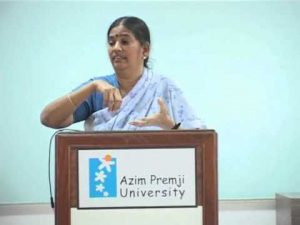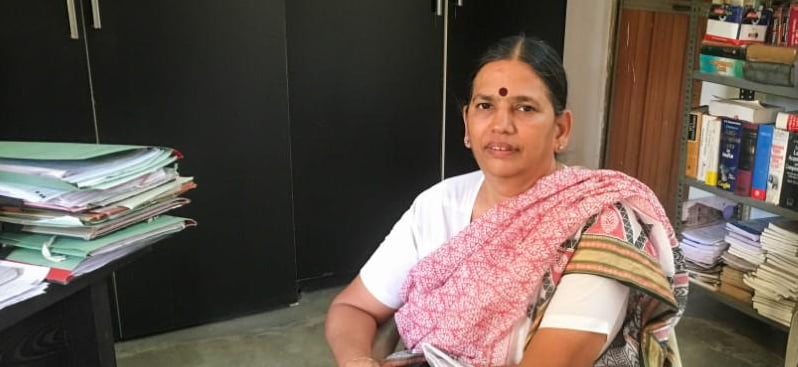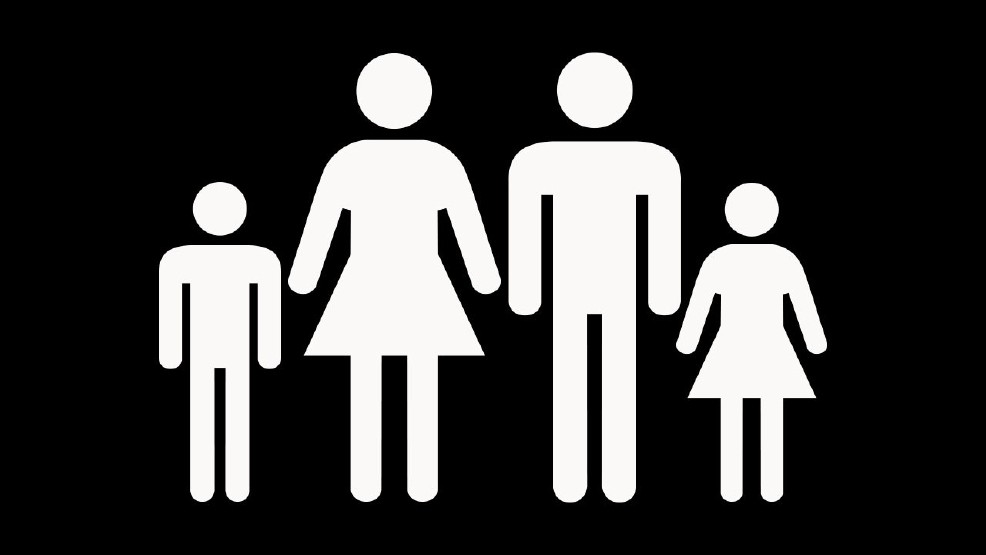“If you try to be safe and be in the middle, you will never succeed. I think physically, those of us who took the plunge learn to swim. Many people did that, we weren’t the only ones.”
– Sudha Bharadwaj
Sudha Bharadwaj is what the locals call a ‘woman of the people’. She is the general secretary of the Chhattisgarh unit of the People’s Union for Civil Liberties (PUCL), a member of Women against Sexual Violence and State Repression (WSS), vice-president of the Indian Association for People’s Lawyers (IAPL), and visiting Professor at National Law University, Delhi. Bharadwaj who is now 57, has been working in the state for almost three decades now, as a trade unionist, a civil rights activist against land acquisition, and a lawyer.
Early Life
Sudha Bharadwaj was born on November 1, 1961 in Massachusetts, US, where her parents were pursuing their PhD. Bharadwaj was an American citizen born to Economist parents, Krishna Bharadwaj and Ranganath Bharadwaj. Her mother was a renowned academician and the founder of the Centre for Economics Studies and Planning in Jawaharlal Nehru University. Later her parents moved to the UK where Bharadwaj did her primary schooling. Her parents separated while she was four years old and was raised as a single child by a single mother. After coming to India, Bharadwaj renounced her US citizenship and joined the Indian Institute of Technology, Kanpur in 1984, to pursue Mathematical Sciences.
The First Experiences
JNU is where Bharadwaj spent her childhood years, where her political consciousness first took roots. Growing up in a politically charged environment which was a hub of intellectual and academic discourse, with vibrant students’ movements all around, Bharadwaj was introduced to subaltern ideas. Thereafter in IIT Kanpur she encountered an academic world riddled with sexism and elitism.
She experienced exclusion as a woman in a largely male-dominated campus and also as an alleged ‘commie’.
She experienced exclusion as a woman in a largely male-dominated campus and also as an alleged ‘commie’. She addressed the problems of the mess workers but her first taste of workers’ protests was at Unnao, in a factory where ceiling fans were made. “There were badli workers who hadn’t been paid for months together and had gheraoed the manager’s officer. They were actually shot at; it was like another Jalianwalla Bagh. That was an incident that shook me up quite a bit”. That was also the time when she first learnt about the work of Shankar Guha Niyogi’s Chhattisgarh Mukti Morcha.

Image Source: Youtube
Niyogi created a very different kind of trade union movement comprising of the miners and contract miners in the captive iron ore mines of the Bhilai Steel. Bharadwaj decided to join the group, eventually moving to the state in 1986. Krishna Bharadwaj cautioned her that as a woman, she must develop her own identity and not be subsumed by the collective.
Also read: On Protesting Against Fascism And The Legend Of Urban Naxals
Bharadwaj also organised women under the Mahila Mukti Morcha, the union’s women’s wing and struggled to bring them to the helm of the leadership within the union. Niyogi was assassinated in 1991 and following that hundreds of workers and their leaders were put in jails while thousands of them were thrown out of work. Bharadwaj being the only ‘educated’ or literate person in Bhilai, assisted the lawyers in taking up the cases of the workers. She spent a lot of time at the High Court and the Industrial Tribunal where once the government prosecutor told her to become a lawyer. In 2000, she got her law degree from a college affiliated to the Pandit Ravishankar Shukla University in Raipur.
At Crossheads With The Law
According to Bharadwaj, the idea was not just to fight legal cases or demand economic rights for workers, but to work for their holistic development by taking care of their health and education needs too. The first cases that she fought were of her own trade union and while working for trade unions she realised not just the workers, but the farmers also required legal representation, given the cases of land acquisition.
“I have acted acted with the professional integrity and courage expected of a human rights lawyer.”
Against this background, she along with a group of lawyers formed a legal organisation called Janhit that helped communities and groups not covered by the usual legal aid system. It provided legal advice to the Chhattisgarh Bachao Andolan, a platform for anti-displacement movements and to the peasants in Raigarh resisting preventive arrests. Janhit also fought for community forests rights, for Adivasis, cases of Public Interest Litigations (PIL), and the environment.
Bharadwaj started practising in the High Court of Chhattisgarh at Bilaspur in 2007 and was nominated by the High Court to be a member of the Chhattisgarh State Legal Services Authority. She appeared in cases of habeas corpus and fake encounters of Adivasis and while she started practicing in the Chhattisgarh High Court, she found a number of draconian laws were being implemented. More specifically, the Chhattisgarh Special Public Security Act (CSPSA). However, in all these cases, she claims, “I have acted acted with the professional integrity and courage expected of a human rights lawyer.”
Bharadwaj has been critical of the criminal justice system keeping in mind her decade long and relentless encounters and struggles with the State machinery. In her words, “To be very frank, it is not my law practice that gives me hope, it is the people who are fighting. There are two types of fight – kagaz ki ladai (fight on paper) and sadak ki ladai (fight on the streets). If you only rely on paper, it is not going to work; you have to agitate on the ground level”. According to Bharadwaj, the vulnerabilities have increased and work has become more difficult post 2014.
Recently in June 2018, Sudha Bharadwaj faced harassment when Republic TV produced a fabricated letter charging her of unlawful and terrorist activities along with Arun Ferreira and Gautam Navlakha. She refuted all such claims as malicious, motivated and fabricated because of her public condemnation of the arrest of Advocate Surendra Gadling in connection with the Bhima Koregaon violence and two other lawyers involved in Sterlite protests. She also issued a public statement condemning the same. Her recent arrest on August 26, 2018 by the Pune Police is a coordinated effort to suppress the voices of dissent and harass and malign human rights activists all over the country.
Also read: 5 Times UAPA Was Used Against Dalit, Bahujan & Adivasi Assertion | #RepealUAPA
About the author(s)
Mahvish is a student of law and a feminist in making. She is in the process of unlearning!




